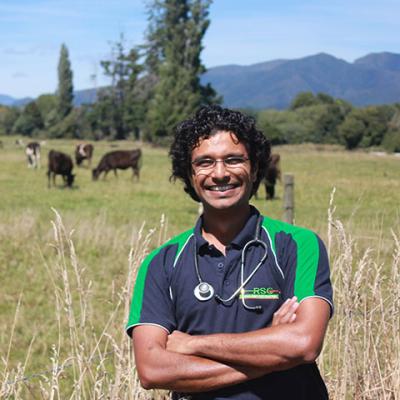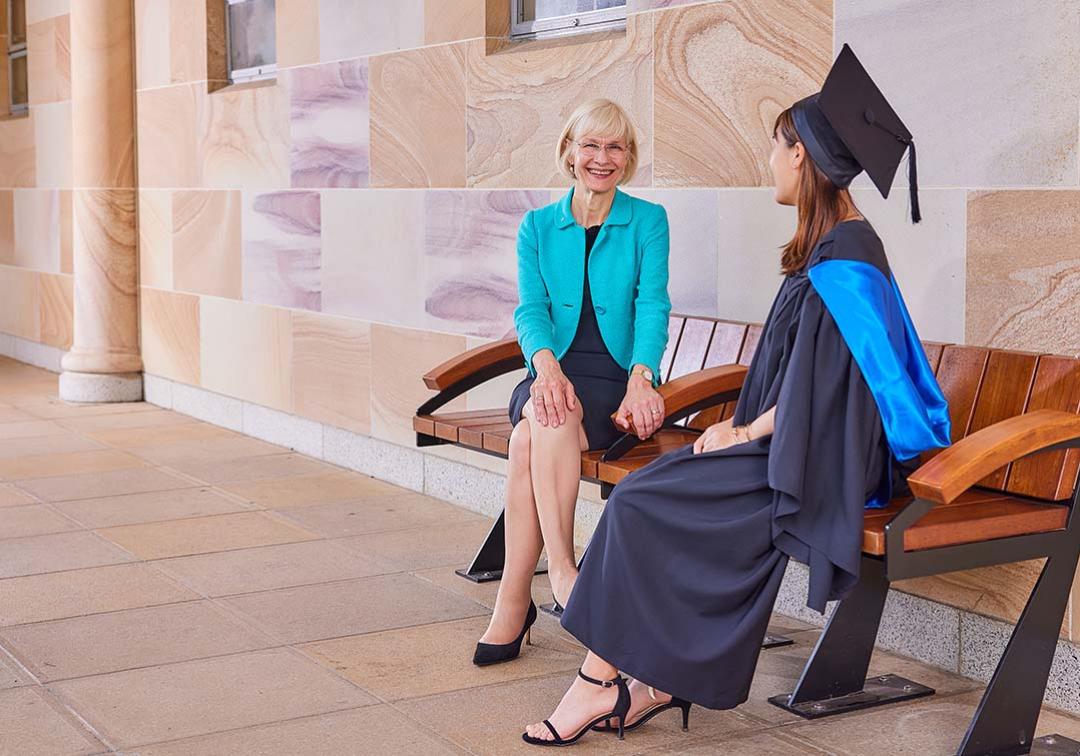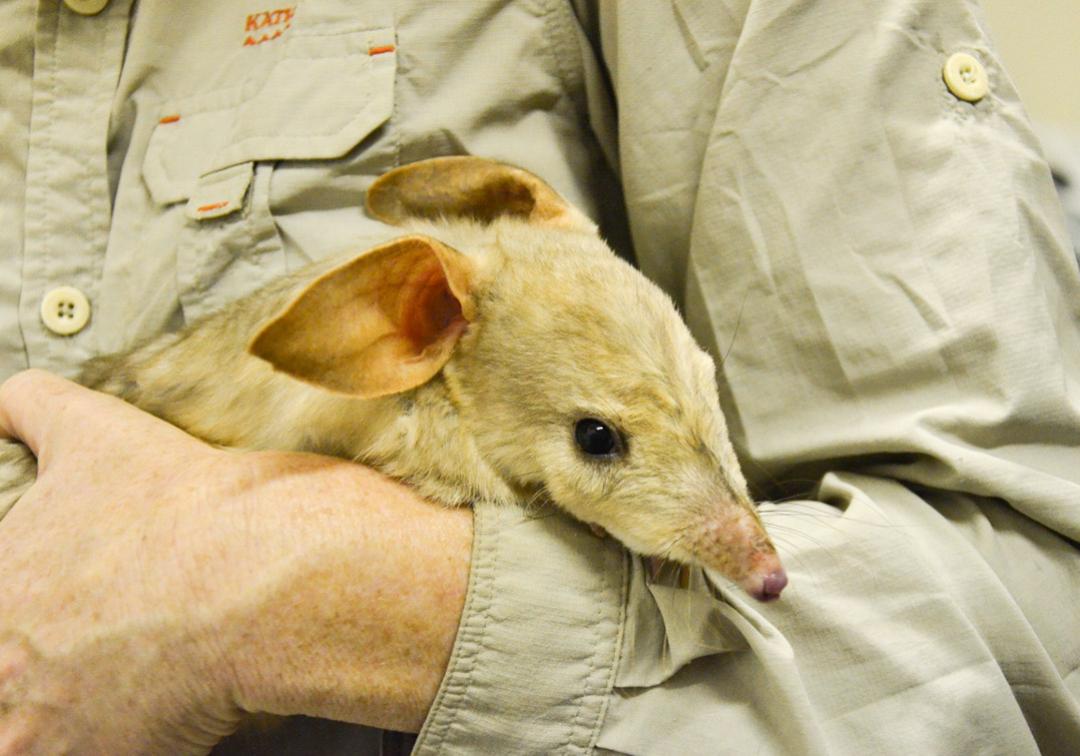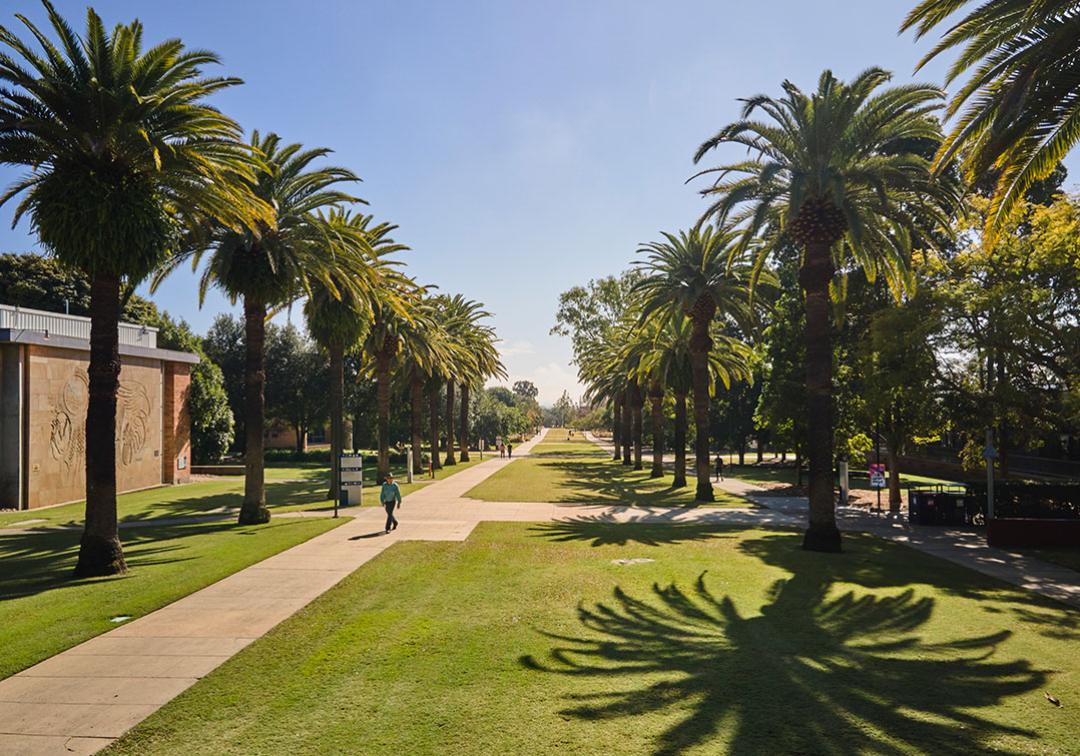
Bachelor of Veterinary Science (Honours)
Overview
Become a fully qualified and internationally recognised veterinarian with the knowledge and practical skills to apply medical, diagnostic and therapeutic care to animals.
At our world-class Gatton campus you'll undertake foundational training in the anatomy, physiology, biochemistry, nutrition and behaviour of healthy domestic and wild animals.
Your first 3 years include more than 600 hours of practical training, where you'll develop animal handling and husbandry skills and acquire detailed knowledge of animal pathology and diagnostics.
In fourth year, you'll undertake dedicated medicine and surgery courses for each of the major animal species, plus population and public health training, and complete 130 hours of clinical practical work.
The final year includes more than 1,400 hours of lecture-free training within university and privately owned veterinary practices. You'll provide authentic care and receive hands-on experience during off-campus placements and at UQ Gatton’s Small Animal Hospital and Equine Specialist Hospital.
This program also teaches essential clinical and professional competencies such as communication, business capability and self-development.
Program highlights
- Study Australia’s only internationally accredited undergraduate Veterinary Science program.
- Enjoy access to world-class facilities, teachers, research and knowledge at UQ's Gatton campus.
- Gain essential hands-on experience in external placements and at UQ Gatton’s Small Animal Hospital and Equine Specialist Hospital.
- Graduate qualified to work as a general veterinary practitioner for large or small animals in Australia and overseas.
How you'll learn
Your learning experiences are designed to best suit the learning outcomes of the courses you choose.
- Lectures
- Tutorials
- Work placements
- Research experience
- Laboratory work
- Fieldwork
- Studios
- Workshops
What you'll study
At UQ, degrees are called 'programs' and subjects are called 'courses'. Here's a sample of the courses you could study in this program:
- Animal and Veterinary Biology
- Rural Veterinary Practice – Livestock Medicine
- Veterinary Public Health and Pathology
- Veterinary Anaesthesia, Diagnostic Imaging and Emergency and Critical Care
Career possibilities
Our programs prepare you for your first job and beyond. Here are some of the careers you could be on your way to:
- Veterinarian
- Animal research scientist
- Veterinary emergency specialist
- Biosecurity field officer
- Animal health officer
- Veterinary surgeon
- Animal management officer
- Veterinary laboratory scientist
- Animal disease control officer
- Veterinary pathologist
Annual average salary range
Veterinarian
seek.com.au
Average annual salary range
Biosecurity Officer
seek.com.au
Next steps after graduation
You will graduate qualified to work as a general veterinary practitioner for large or small animals in Australia and overseas.
Expect to find employment in a variety of roles, including:
- practising veterinary doctor in a private or public clinic
- consultant in the pharmaceuticals, biotechnology or animal disease control industries
- educator and/or researcher with universities and governments
- government department veterinarian dealing with biosecurity and/or efficient animal production.
Professional memberships
When you graduate, you may be eligible for memberships with the following professional organisations. Contact the organisation to find out how to become a member.
- Australasian Veterinary Boards Council Inc
- American Veterinary Medical Association
- Royal College of Veterinary Surgeons
Events
See all eventsStories
See all stories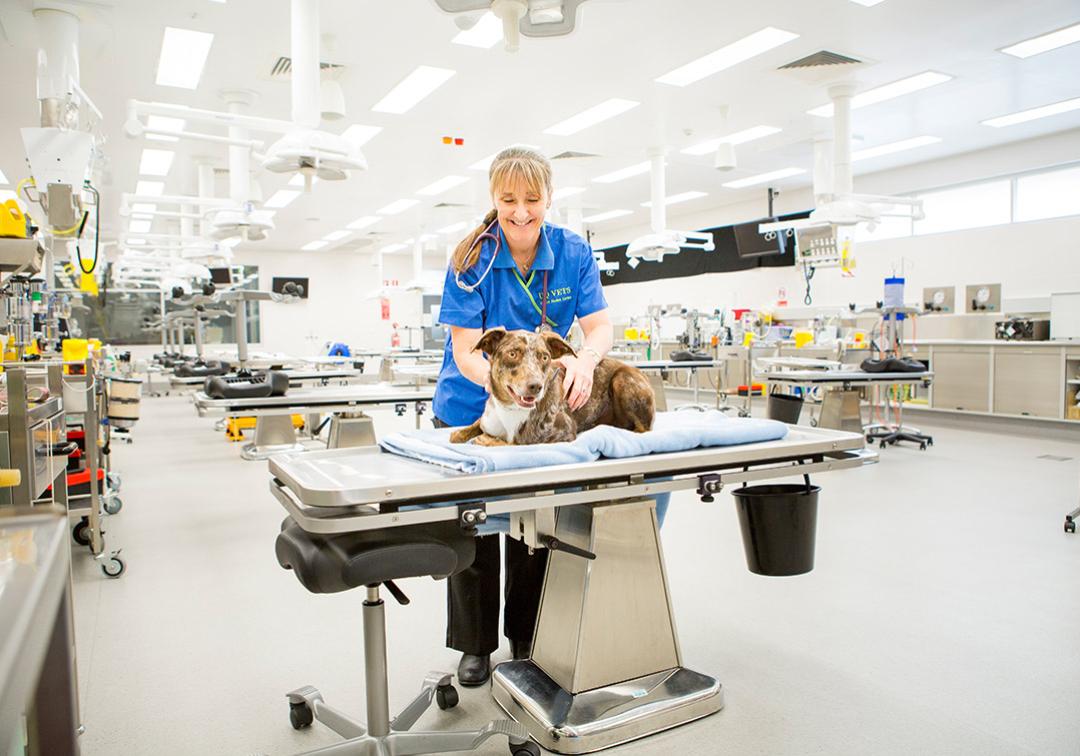
Study tips
How to identify the best veterinary universities in Australia
5-minute read
Stories
See all stories
Study tips
How to identify the best veterinary universities in Australia
5-minute read
Entry requirements
Prerequisites
- General English subject (Units 3 & 4, C)
- Chemistry (Units 3 & 4, C)
- Mathematical Methods (Units 3 & 4, C); and
- one of Physics or Biology (Units 3 & 4, C).
Changes to the 2026 intake
From the 2026 intake onwards, the way the Situational Judgement Test results are considered as part of the admissions process will change.
See 'Additional Applicant Information' below to find out how your Situational Judgement Test results will be used.
Prerequisites
- General English subject (Units 3 & 4, C)
- Chemistry (Units 3 & 4, C)
- Mathematical Methods (Units 3 & 4, C); and
- one of Physics or Biology (Units 3 & 4, C).
Changes to the 2026 intake
From the 2026 intake onwards, the way the Situational Judgement Test results are considered as part of the admissions process will change.
See 'Additional Applicant Information' below to find out how your Situational Judgement Test results will be used.
Entry score threshold
| ATAR / Rank | IB |
|---|---|
| 99.7 | 45 |
These are the lowest adjusted scores we made an offer to in Semester 1, 2025. Entry scores are based on the most recent Semester 1 intake and are updated in April each year. Meeting the entry score threshold doesn't guarantee admission.
Guarantee your place at UQ: If you meet our guaranteed minimum ATAR you could secure an offer for your preferred program.
English language requirements
IELTS overall 7; reading 7; writing 7; speaking 7; listening 7. For other English Language Proficiency Tests and Scores approved for UQ
TOEFL iBT (including Paper Edition) - Overall 100, listening 25, reading 25, writing 27, speaking 23.
PTE Academic - Overall 72, sub bands minimum 72.
CES - Overall 185, All sub bands minimum 185.
BE and OET are not accepted.
There are other ways to meet the English language requirements. For some programs, additional conditions apply.
Inherent requirements
To complete this degree, you have to meet its inherent requirements by demonstrating essential skills and attributes. Read the inherent requirements before you apply.
Student visas
International students who are accepted into full-time study in the Bachelor of Veterinary Science (Honours) are eligible to apply for an Australian student visa (subclass 500).
There are a number of requirements you must satisfy before a visa is granted, including the Genuine Student (GS) requirement.
Entry score range
This table shows the range of entry scores for recent secondary students offered a place in the B Veterinary Science (Hons) for Semester 1, 2025
| Without adjustments | With adjustments | |
|---|---|---|
| Highest | 99.95 | 99.95 |
| Median | 98 | 99.95 |
| Lowest | 96.05 | 99.7 |
Who you'll study with
Here's a snapshot of our student intake for this program in Semester 1, 2025:
| Applicant background | Number of students | Percentage of all students |
|---|---|---|
(A) Higher education study | 68 | 44.2% |
(B) Vocational Education and Training (VET) study | <5 | <5 |
(C) Work and life experience | 0 | 0% |
| (D) Recent secondary education | ||
| 0 | 0% |
| N/P | N/P |
| 0 | 0% |
International students | 63 | 40.9% |
Total | 154 | 100% |
"<5" — The number of students is less than 5.
N/A — Students not accepted in this category.
N/P — Not published. The number is hidden to protect the privacy of students in other cells.
Need help meeting the entry requirements?
Additional application information
You'll be exposed to animals and agricultural environments as part of your learning. Immunisations against tetanus and Q fever are mandatory and you'll be required to provide evidence of immunisation upon commencement of the program. Refer to the UQ Student Immunisation Requirements for more information.
Selection of Applicants
The selection process uses a combination of both academic and non-academic performance.
Minimum Requirements
Combined Final Selection Index (CFSI)
The adjusted ATAR/tertiary study selection ranks and Casper Test scores are converted into Academic and Non-academic Selection Ranks.
An applicant's CFSI is calculated using this formula: CFSI = (Academic Selection Rank x 0.6) + (Non-academic Selection Rank x 0.4).
Applicants are sorted in the order of the Combined Final Selection Index and offers are made to applicants from the top of the list until all places are filled.
What happens if two applicants have the same Combined Final Selection Index?
Additional application information
You'll be exposed to animals and agricultural environments as part of your learning. Immunisations against tetanus and Q fever are mandatory and you'll be required to provide evidence of immunisation upon commencement of the program. Q fever screening and vaccination is currently only available in Australia. Refer to the UQ Student Immunisation Requirements for more information.
Selection of Applicants
Applicants must obtain a score which is higher than 1.5 standard deviataions below the mean score for the test for that sitting.
Fees and Scholarships
Indicative annual fee
Approximate yearly cost of tuition (16 units). Your fees will vary according to your selected courses and study load. Fees are reviewed each year and may increase.
$11,925
2026
Approximate yearly cost of tuition (16 units). Your fees will vary according to your study load. Fees are reviewed each year and may increase.
AUD $85,440
2026
Government assistance
Financial aid
As an international student, you might be eligible for financial aid – either from your home country, or from the Australian Government.
HECS-HELP
Domestic places in the Bachelor of Veterinary Science (Honours) are Commonwealth supported, as long as you meet all Commonwealth supported place eligibility requirements.
This means the cost of your education is shared between you and the Australian Government. Instead of tuition fees, Commonwealth supported students pay what are called student contribution amounts.
If you have a Commonwealth supported place, you may also be eligible for HECS-HELP. This is an Australian Government loan scheme to assist eligible students with the cost of their student contribution amounts.
Centrelink support
The Australian Government offers a number of income-support payments to eligible Australian university students.
Scholarships
You may be eligible for more than 100 scholarships, including:
How to apply
Applying online
If your senior schooling is from outside Australia, you can submit your application to UQ. Or, if you prefer, you can use an approved UQ agent near you.
The program code for the Bachelor of Veterinary Science (Honours) is 2378.
How to apply for undergraduate study
If your senior schooling is from Australia
Submit your application to the Queensland Tertiary Admissions Centre if you're an international student who is currently studying:
- Australian Year 12 (in Australia or another country), or
- the International Baccalaureate in Australia.
The QTAC code for the Bachelor of Veterinary Science (Honours) is 736002.
Applying through QTAC
All domestic applications should be submitted to the Queensland Tertiary Admissions Centre (QTAC).
The QTAC code for the Bachelor of Veterinary Science (Honours) is 736002.
Important dates
If you’re studying Year 12 in Australia, go to the QTAC website to check the closing date for this program.
If you’re applying to UQ, the closing date for this program is:
- To commence study in semester 1 - September 30 of the previous year.
Visa processing times vary. Apply and accept your offer as early as you can.
To learn more about UQ dates, including semester start dates, view the Academic Calendar.
Important dates
To check the closing date for this program, go to the QTAC website.
To learn more about UQ dates, including semester start dates, view the Academic Calendar.
Admissions schemes
Applying to university can be both exciting and daunting, which is why we’ve tried to make the process as simple as we can.
We have several schemes in place to improve your chances of getting a place at UQ.
Pathway options
A rank or score doesn’t determine your potential.
If you're not offered a place in your first-choice program – or if you don't meet the entry requirements – you still have a number of options.
Aboriginal and Torres Strait Islander applicants
For support with applying – or if you have any questions about university life – get in touch with our Aboriginal and Torres Strait Islander Studies (ATSIS) Unit.
Explore other programs
Express yourself. And your interest.
They say choosing a degree is hard, which is why we've made it easy. Register your interest and we'll send you everything you need to know about applying to UQ.



